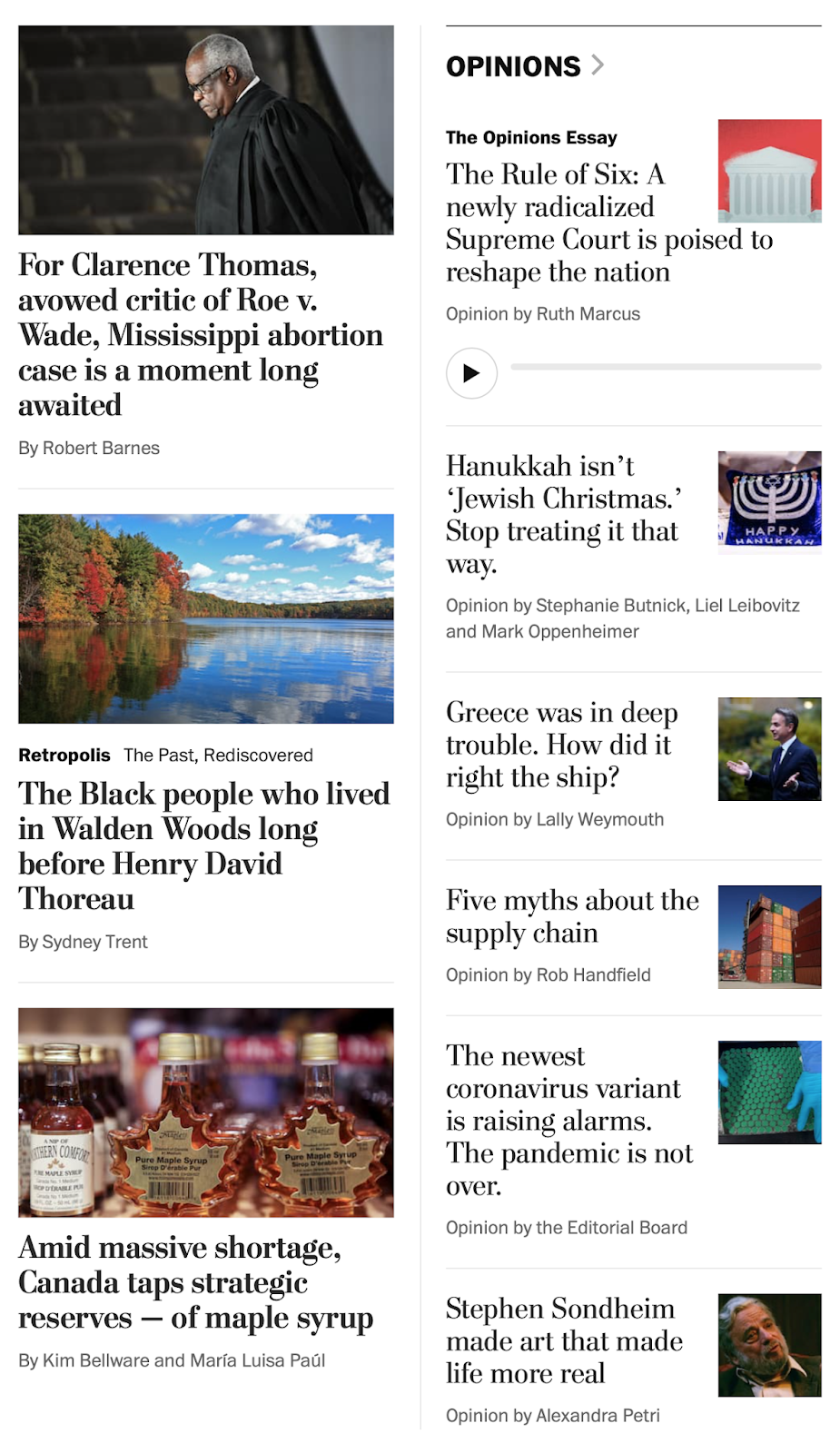
४ डिसेंबर, २०२१
Sunrise — 7:04 and 7:19.

"In the Michigan Shooting, What Is the School’s Responsibility?"
First, a teacher found Ethan Crumbley searching online for ammunition. The next day, there was an alarming note on his desk: “The thoughts won’t stop. Help me.” School officials met with Mr. Crumbley, 15, and his parents, informing them that he needed to begin counseling within 48 hours. After his parents resisted bringing him home, administrators allowed him to stay in school....
The parents have been arrested and charged with involuntary manslaughter. Isn't the school more responsible?
Catherine J. Ross, a law professor at George Washington University and expert on student rights, said she found the school’s reaction “truly astounding.”... If the parents refused to take Mr. Crumbley home, it was the legal and ethical responsibility of the school, Professor Ross said, to “remove the student from the classroom and put them in a safe place — safe for other people and safe for themselves.”
By "put them in a safe place," I think Ross means put Ethan Crumbley in custody. He apparently begged "help me." It sounds as though he struggled with an uncontrollable impulse. I understand the school wanting to defend itself after the fact, but what's more important is for schools to take action to protect the students who are trapped there and endangered by other students.
This is part of a larger issue of government declining to keep the peace and attempting to convince us that it cannot keep the peace, something I wrote about last month, after the Rittenhouse verdict and the Waukesha massacre, here:
Sunrise on Lake Mendota — 7:04 — what am I laughing at?
Ducks! I am easily amused. Sunrise. Ducks ducking. What more can you want?
It goes to show you don't ever know.
"This from a man who wrote a book called 'Principles.'"
"What they have is an autocratic system and one of the leaders described it that the U.S. is a country of individuals and individualism...in China it is an extension of the family," says @RayDalio. "As a top down country what they are doing is--they behave like a strict parent." pic.twitter.com/MNZKMdtPy2
— Squawk Box (@SquawkCNBC) November 30, 2021
"Two programs at Harvard Law show close ties between the school, the Democratic Party, and liberal activist groups with an interest in fighting elections through the judicial system."
"Democrats in Springfield had total control over the redistricting process in the state and used their power to roil the GOP delegation."
What's that stench in the courtroom?
She said many abortion opponents, including the sponsors of the Mississippi abortion law at issue, hoped her three new colleagues would allow for the reversal or reduction of Roe v. Wade. With Justices Brett Kavanaugh, Neil Gorsuch and Amy Coney Barrett listening, she asked, “Will this institution survive the stench” created from such political machinations — and then answered: “I don’t see how it is possible."
Of course, when justices begin to declare their disgust at the very thought of overturning precedent, there is another detectable scent in the courtroom. Indeed, it felt like a scene from Tennessee Williams's play, “Cat on a Hot Tin Roof.” The only thing missing was the play’s central character, “Big Daddy” Pollitt, asking: “What's that smell in this room? … Didn’t you notice a powerful and obnoxious odor of mendacity in this room? There ain’t nothin’ more powerful than the odor of mendacity.”
Of course, when people detect bad odors, there's another famous line that comes to mind: "He who smelt it dealt it."
If we're going to detect lies, and characterize lies as smells, there are lies all around, possibly lies all the way down. If you think the other side's lies — however you define lies, perhaps broadly — smell bad, what about your own lies? Does your shit not stink?
Here's a famous dead baby joke from the 1960s:
What's harder to unload, a truck full of bowling balls or a truck full of dead babies?
A truck full of bowling balls because you can't use a pitchfork.
That's quoted in the scholarly article "The Dead Baby Joke Cycle" by Alan Dundes (Western Folklore). One of the follow-on jokes to that one is:
What's worse to be buried under: bowling balls or dead babies?
Bowling balls — you can't eat your way out.
Why were we telling jokes like that in the 1960s and into the 1970s? Why was this overt callousness attractive, and why did it fade out? Jokes play off of anxiety, but maybe after you've laughed enough, you've overcome the anxiety, so there's nothing to cause laughter. What's that smell in this room? If you've been in that room long enough, you can't smell it at all.
Sotomayor predicted a stench that would arise from the new decision — the overruling of Roe. Sotomayor seems to be saying that her new colleagues are disgusting — deplorable — they stink. Or they will stink, if they use their current majority to rewrite the work of an earlier majority that she doesn't find disgusting.
Another clue about what's that smell came from Justice Breyer, who said:
"[T]he problem with a super case like this, the rare case, the watershed case, where people are really opposed on both sides and they really fight each other, is they're going to be ready to say, no, you're just political, you're just politicians. And that's what kills us as an American institution.... and that they say is a reason why... when you get a case like that, you better be damn sure that the normal stare considerations, stare decisis overrulings are really there in spades, double, triple, quadruple, and then they go through and show they're not."
That is, by the way, the only point in the transcript where anyone uses the verb "to kill." There's no truckload of dead babies on the premises. It's all about the reputation of the Supreme Court as an institution. If it's ever discovered that it's "just political" — key word, "just" — then it is killed! And the stench is the rotting corpse of the dead Supreme Court. Dead, presumably, because even though everyone already knew that the Court was political — is there an older accusation against it? — it had some element that was not political, making it not just political.
३ डिसेंबर, २०२१
Did Trump say he would only nominate Justices who committed to overruling Roe v. Wade?
I heard the NYT reporter Adam Liptak make that assertion (on yesterday's episode of the NYT "Daily" podcast), and I wondered if that was strictly accurate.
Writing every day, I've followed Trump very closely, and I believe if he said anything like that, I would have blogged about it, and the key words to search my archive are so clear — Trump... Supreme Court... abortion — that I'm going to believe the answer is "no" if I am unable to find it.
***
I needed to read through about 20 old posts to find what is relevant to my question — only 3 posts, which I'll present in chronological order, with boldface added:
I asked, "Why hasn't Trump said anything about the Supreme Court's new abortion case?" Answering my own question: "Gender politics isn't his thing. He only talks about abortion when pushed or when attacked."
Chris Wallace, moderating a debate, asked where the Supreme Court should take the country and what's the right approach to constitutional interpretation. Trump blathered a bit, seized on the Second Amendment, and threw in "The justices that I am going to appoint will be pro-life." You can be pro-life and still decide reaffirm the long-standing precedent, so his answer is an evasion. Wallace was smart to follow up:
"Former president Donald Trump this week asked a federal judge to dismiss a defamation lawsuit filed against him by E. Jean Carroll.... a new 'anti-SLAPP' law passed in New York state last year...."
"Sorry but I don’t think it’s a big deal... Im just sad people get their feelings hurt so easily. And they are going into Theatre?"
If there was one thing Earnest tried to instill in his students, it was toughness. He would warn them that acting is a brutal profession full of rejection and requires a sturdy exoskeleton to survive. He himself is a rare species in the world of theater: a Donald Trump-voting conservative from a small town in Alabama with a deep passion for avant-garde European theater.
Among the videos his freshmen watch in class is a postmodern remake of Henrik Ibsen’s “The Wild Duck” that includes a scene in which a father places his penis on a table while his blind daughter swings at it with a hammer....
As more speech is construed as hurtful or even dangerous, can a professor be dismissed for creating an “uncomfortable” learning environment or “endangering” students?...
Much more at the link. I got past the paywall by clicking "Reader View." My post leaves out everything about the incident that set everything in motion. I've selected the material about teaching toughness on the theory that students are going to need it to succeed in the world.
ADDED: I kept thinking about that blind daughter swinging a hammer at her father's penis, so I googled and found this in a philosophy dissertation, "Theatres of Reality, Fiction, and Temporality: Vegard Vinge and Ida Müller’s Ibsen-Saga (2006-2015)" by Andrew Friedman:
"'Your playlist is as long as your skincare regime,' Spotify told me on Spotify Wrapped. Given that my 'skincare regime' lasts for the five seconds it takes..."
"For a long time I have defended ideas and convictions and become what we call an intellectual. In truth, the problem in France is..."
"Was I a brawler? Mean to women? Not at all. No, I don’t have the looks. I don’t have the physique. And I don’t have the mentality either. No, no, I’m very French. I like flirting, the culture of flirtatiousness. I like French courtesy. I just think... there has been a domination of what we call women’s values, that is to say that peace is preferred to war, consensus over choice. It is these values that push your daughter to say, ‘Ooh là là! We must absolutely respect the values of others.’ Your daughter must be careful to respect other values, which are more masculine, like taking responsibility. It is man’s nature to defend."
२ डिसेंबर, २०२१
Sunrise — 7:09, 7:11, 7:18.

Justice Amy Coney Barrett connected the right to abortion and the right against mandatory vaccines.
"Hi Ann - long-time local reader. After Breyer mused on 'super stare decisis' today I duck-duck-go'd it and your 2005 post was one of the first results...."
It is certainly true that we cannot base our decisions on whether they're popular or not with the people. Casey seemed to say we shouldn't base our decisions not only on that but whether they're going to -- whether they're going to seem popular, and it seemed to me to have a paradoxical conclusion that the more unpopular the decisions are, the firmer the Court should be in not departing from prior precedent, sort of a super stare decisis, but it's super stare decisis for what are regarded as -- by many, as the most erroneous decisions. Do you think there is that category? Is there -- or is it just normal stare decisis?
"I would never point a gun at anyone and pull a trigger at them — never.... Well, the trigger wasn’t pulled. I didn’t pull the trigger."
Only 4% of the passenger vehicles bought in the U.S. in 2021 are electric, and it's obvious why: "range anxiety."
Am I in denial about the coming demise of Roe ?
After listening to the oral argument yesterday — before reading any commentary — I wrote "I predict stare decisis will prevail." This morning I'm reading the commentary, and everyone seems to be saying they know the Court will overrule Roe Casey, so I thought I'd link to a few things and then speculate about why, politically, that's what you'd want to say.
So, first, the NYT, Adam Liptak: "Supreme Court Appears Open to Upholding Mississippi Abortion Restriction/After two hours of sometimes tense exchanges in one of the most significant abortion cases in years, the court appeared poised to uphold the state law, which bans abortions after 15 weeks of pregnancy." Liptak is vote counting, and he sees Roberts as looking for a middle way — drawing the line somewhere other than viability. Roberts needs another vote, and "the most likely candidates, Justices Brett M. Kavanaugh and Amy Coney Barrett, said little to suggest that they were inclined toward that narrower approach." This middle way would resemble Casey, keeping the essence while changing the doctrine.
Next, here's Noah Feldman at Bloomberg: "The Supreme Court Seems Poised to Overturn Roe v. Wade/The chief justice suggested a way to restrict abortion without going that far, but the swing voters didn’t engage his potential compromise." That sounds just like Liptak's position, but Feldman goes further characterizing the mindset of Justices Brett Kavanaugh and Amy Coney Barrett: they "seemed pretty set on making history by overturning Roe."
Third, here's Amy Howe at SCOTUSblog: "Majority of court appears poised to roll back abortion rights." Howe counts Kavanaugh among the Justices who seem ready to "overrule Roe and Casey outright." She sees Gorsuch and Barrett as the ones who might join Roberts in this imagined middle position.
Just one more — Dahlia Lithwick at Slate: "SCOTUS Will Gaslight Us Until the End/Oral arguments today made clear that this court will overturn Roe—and that they’ll insist on their own reasonableness the whole time." This piece is different from the other 3. It's much more of a rant, but overruling Roe Casey, if that's what the Court is really up to, deserves a rant. Lithwick doesn't believe the "precious" talk of the seemingly more moderate conservatives: It's a 6-3 Court and that's that.
I'm going to look at the transcript closely soon, and I'll explain why I think the middle position didn't get much traction and why, consequently, I'm going to stick with my position that the pro-abortion-rights position will win. But just to repeat what I already said: For all the weakness of viability as the place to draw the line, there is no better place, nothing with more of a real-world factual basis. And viability is the line that the precedent draws.
But I see the value of predicting the overruling of Roe (that is, Casey). Activate people now. Get the political movement started early, because it will be immensely powerful if the Court overrules Casey ("Roe"). And there's some chance that the vision of powerfully activated Democratic Party politics will influence the conservatives on the Court and cause them to preserve the precedent.
१ डिसेंबर, २०२१
Late afternoon sky.
No sunrise run this morning. It was raining — raining on December 1st. Snow would have been much nicer, but it didn't happen. At 3:45 p.m. it was 48° — which was chilly enough on the exposed prairie (AKA the dog park). The pre-sunset sky looked like this:

Listen to the oral argument, starting now.
By deciding this question under the Constitution, the Court removes it from the realm of democratic decision. There will be consequences to shutting down the political process on an issue of such profound public significance. Closing debate tends to close minds. People denied a voice are less likely to accept the ruling of a court on an issue that does not seem to be the sort of thing courts usually decide. As a thoughtful commentator observed about another issue, “The political process was moving . . . , not swiftly enough for advocates of quick, complete change, but majoritarian institutions were listening and acting. Heavy-handed judicial intervention was difficult to justify and appears to have provoked, not resolved, conflict.” Ginsburg, Some Thoughts on Autonomy and Equality in Relation to Roe v. Wade, 63 N. C. L. Rev. 375, 385–386 (1985) (footnote omitted). Indeed, however heartened the proponents of same-sex marriage might be on this day, it is worth acknowledging what they have lost, and lost forever: the opportunity to win the true acceptance that comes from persuading their fellow citizens of the justice of their cause. And they lose this just when the winds of change were freshening at their backs.
Boldface added.
That was 6 years ago. What "winds of change" are "freshening... backs" today?
In any case, the question then was whether to take something out of the political arena. The question now is whether to throw something back in after it's been out for 50 years!
AND: On the theme of keeping the government's hands out of our body, Amy Coney Barrett brought up mandatory vaccination.
"Set against a pastoral Californian back yard, it at times resembled a play with three characters: a discontented (for good reason) woman, her angry and accommodating husband, and a mediator..."
"More than 140 amicus briefs were filed in Dobbs v. Jackson Women’s Health Organization, the potentially momentous abortion case concerning a Mississippi law banning abortion after 15 weeks of pregnancy."
"When confronted with the reality that the Democratic Party is losing Black and Latino moderates, the response on the left is often to treat their views as morally beyond the pale."
"My goal in 1982 was justice – not to perpetuate injustice. And certainly not to forever, and irreparably, alter a young man’s life by the very crime that had altered mine."
"West Side Story is fantastic. White people gonna be big mad tho and good. Bless you Steven Spielberg for not subtitling when our people use our language."
३० नोव्हेंबर, २०२१
Melania was cold. Jill is warm.
Ugh. I should have steeled myself against this offensive goo. It's so very predictable. But I wasn't ready — it's still November — and this caught me before I'd prepared myself to simply laugh cynically, which is what it deserves:
A taste of the holiday fare:The light, sound and smell of wood fires burning in the Green and Red rooms were just the first sign of the intimacy Jill Biden sought.... Gone are Melania Trump’s imposing — and some said, scary — blood red trees in the East Colonnade, from 2018, which late-night TV host Jimmy Fallon likened to Christmas in hell. Gone are the dozens of life-size “snow people,” wearing scarves and hats, in the first lady’s garden, installed by Michelle Obama in 2015, and moved inside in 2016.... “There’s a whole kind of Chucky element to them,” [Barack Obama] said. “They’re a little creepy.” Instead, Jill Biden’s Colonnade is a lower-key presentation, with shooting stars and peace doves hanging from the ceiling.... Biden’s first foray into holiday decorating at the White House was not glitzy or opulent, but rather an enhanced version of how many American families decorate their own homes, with lots of candles and twinkling lights....
So "some said" Melania's Christmas decorations were "scary." Why not cherry-pick the meanest things "some" are saying about Jill's decorations? I'll just read between the lines and flip the descriptions of Jill's stuff into the negative: It's so thudding uncreative. No grandeur, no awe, just the rich and powerful serving up their idea of what ordinary Americans supposedly do with their own home.
Now, I must admit that WaPo isn't completely partisan, because — did you notice? — it takes a shot at Michelle Obama too, though the insult is a quote from her husband, who thought her snowmen and -women were "creepy" and Chucky-like.
Ugh. The competition assigned to first ladies. Who's warm? Who's genuine? Who's got the best taste in clothes and interior decoration? Why is this still going on?
"I remember that day well" — the day Roe was decided — "because it was also the day when former president Lyndon B. Johnson died."
"[Elizabeth] Holmes became teary-eyed on the stand as she described dropping out of Stanford University, in part, because she had been raped."
Random movie watched yesterday: The Luis Bunuel version of "Robinson Crusoe" from 1954.
Defoe was a prolific and versatile writer, producing more than three hundred works—books, pamphlets, and journals — on diverse topics, including politics, crime, religion, marriage, psychology, and the supernatural. He was also a pioneer of business journalism and economic journalism.... In Defoe's early childhood, he experienced some of the most unusual occurrences in English history: in 1665, 70,000 were killed by the Great Plague of London, and the next year, the Great Fire of London left only Defoe's and two other houses standing in his neighbourhood.... Defoe died on 24 April 1731, probably while in hiding from his creditors. He was often in debtors' prison. The cause of his death was labelled as lethargy....
"We have always been trying to strike the right balance between enforcement, rehabilitation and prevention."
Said Manhattan district attorney Cyrus R. Vance Jr., quoted in "Supervised Injection Sites for Drug Users to Open in New York City/The Manhattan facilities will provide clean needles, administer medication to reverse overdoses and provide users with options for addiction treatment" (NYT).
"Everybody learned a lot this year, and I just want to make sure there’s absolutely nothing that could ever be considered as insulting to Chinese culture."
Dancers and choreographers of Asian descent say the revisions to “Nutcracker” are long overdue. Ma Cong, resident choreographer of Tulsa Ballet, said he was confused when he first saw “Nutcracker” productions featuring exaggerated makeup and stereotypical costumes. Ma, who grew up in China, recalled thinking, “That is not Chinese.”
२९ नोव्हेंबर, २०२१
Sunrise — 7:00.

"Though it’s the film’s quieter absurdities – like its glorious shot of Crawford, sheathed in platinum sequins, descending a curved staircase while she scowls at a plate of cold, congealed steak – that tickle me more than its chaotic, cacophonous climaxes."
George yawns as Paul invents "Get Back" out of thin air.
Watching Paul come up with “Get Back” out of literally thinking air while Ringo and George just yawn is a marvel to watch. This Beatles documentary is INSANE #TheBeatlesGetBack pic.twitter.com/09Nii0tHqr
— Darth Yavin (@DarthYavin) November 27, 2021
"But what Biden knows, after three-plus decades of being politically left for dead, is that nothing’s over just because a bunch of unnamed staffers who spend too much time reading polls say it’s over."
From "Panicked Democrats are ready to shove Biden aside. Again" by Matt Bai (WaPo).
Elon Musk "became a bright antithesis to Russian capitalism, a guide on how you can get rich in the right way and how you can spend the money you earned in the right way."
Said Alexey Firsov, founder of the Platforma sociological research and consulting firm, quoted in "Memes, merchandise and Mars cocktails: Russia’s mania for Elon Musk has no bounds" (WaPo).
"There are two pronouns: he and she. Our language is beautiful. And two pronouns are appropriate."
Lilian Delhomme, 24, a gender-nonconforming student of international affairs at the University of Paris 8 who has been using the pronoun “iel” for about a year, was appalled by Ms. Macron’s statement.
“This for me was very violent,” Mx. Delhomme said in an interview. “Coming from the first lady, from a woman, from a French teacher, from someone whose relationship went against many societal norms, it made me lose hope.”
Mx. Delhomme was referring to the fact that the relationship between Ms. Macron, 68, and Mr. Macron, 43, began in high school when he was a teenager and she was his drama teacher, married with three children....That's a nice example of going on the offense, but I wonder if the French who are outraged about the invention of ungendered pronouns might also reject the "many societal norms" that stand in the way of a sexual relationship between a teenaged student and his high school teacher. I don't know. I am not French. I don't have my finger on the pulse of the French.
"As South Koreans enter the living-with-corona phase of the pandemic, some are easing back into social life by visiting public spaces where they can be alone and do very little."
२८ नोव्हेंबर, २०२१
Sunrise — 7:11, 7:17.
"In many years of working as a travel writer — which I’ve often thought of as working the awe beat — I’ve come to understand that awe cannot be easily choreographed."
I'm pulled into the upper right hand corner of The Washington Post — so dangerous, so syrup-drenched.
It's an omakase breakfast — omakase, not omicron — the selections entrusted to the illustrious mainstream newspaper. I will update this post, course by course.
1. "For Clarence Thomas, avowed critic of Roe v. Wade, Mississippi abortion case a moment long awaited" by Robert Barnes. There's oral argument in the big abortion case this Wednesday, and, we're told, Thomas receives "unprecedented deference" these days — because of all his new colleagues, who "think like him," and because there's a new method of asking questions at oral argument, and not only does he speak now, he goes first, and no one cuts him off. They let him finish "his low-key inquiries." Thomas has repeatedly written separate opinions to say that Roe ought to be overruled. "Thomas’s idiosyncratic views and his resistance to compromise still make him the justice most likely to write a solo opinion," writes Barnes. But what's to prevent these new Justices, who may genuinely respect him, from curing that loneliness? Asking that question, I thought of the adage, "Any man more right than his neighbors constitutes a majority of one already." And then I realized I'm talking about the person named in the next headline down, Henry David Thoreau.
2. "The Black people who lived in Walden Woods long before Henry David Thoreau": "'Down the road, on the right hand, on Brister’s Hill lived Brister Freeman, ‘a handy Negro,’ slave of Squire Cummings once... With him dwelt Fenda, his hospitable wife, who told fortunes, yet pleasantly – large, round, and black, blacker than any of the children of night, such a dusky orb as never rose on Concord before or since,' Thoreau wrote in 'Walden.'"
3. "Amid massive shortage, Canada taps strategic reserves — of maple syrup": "Petroleum stockpiles aren’t the only strategic reserves being tapped this season amid concerns of supply shortages and sky-high prices." There's a Canadian federation that, we're told, gets called "the OPEC of maple syrup." The shortage seems to have mostly to do with people cooking more pancakes and such on account of the lockdown, but there's also stress to the maple trees from climate change, so make sure to keep worrying about climate change. It affects pancakes!
4. "The Rule of Six: A newly radicalized Supreme Court is poised to reshape the nation" by Ruth Marcus. The conservatives are no longer just looking for a 5th vote. With 6, it's like "an heir and spare." They can afford to lose one. No more need to cajole that last one, the fussed-over "swing" voter. And Marcus tells WaPo readers to be be afraid, be very afraid.
5. "Hanukkah isn’t ‘Jewish Christmas.’ Stop treating it that way. No need to include our holiday in the winter extravaganza of commercialization, thanks." Sample sentence, representing the tone and message of the entire piece: "No Jew has ever gazed longingly at a 12-foot inflatable reindeer and wished in her heart she had an equally large Moses to display in front of her house."
6. "Greece was in deep trouble. How did it right the ship? Prime Minister Kyriakos Mitsotakis on the arrival of migrants — and tech companies." An interview with the prime minister. Highlights: "We should agree in principle that no country has a right to weaponize migrants. . . . We won’t let people come in as they please." About criminalizing “fake news”: "What we are doing is very measured and very valid."
7. "Five myths about the supply chain/No, self-driving trucks wouldn’t fix all our problems." "Much of today’s mess was caused by relying on extremely fragile — and extremely long — supply lines. Ohno would have shuddered at the thought that his ideas were being applied in this manner." Oh no! Taiichi Ohno originated the concept of just-in-time delivery.
8. "The newest coronavirus variant is raising alarms. The pandemic is not over." "It will take time to determine if the variant is more transmissible than delta, or more virulent, but it is a worrisome development." Won't there always be a new variant so that we will always be told we don't know enough yet and we will need, once again, to err on the side of safety? This feels like a treadmill that we can never step off.
9. "Stephen Sondheim made art that made life more real" by Alexandra Petri. A song "can’t be too clever, and it can’t be too dull. It has to land on your ear as a surprise. If it contains jokes, they have to rhyme. (If it contains rhymes, words that are spelled differently are funnier, Sondheim thought, than words that are spelled the same.)... The song has to take the character singing it somewhere. It has to be essential to the show. 'If you can take the song out,' Sondheim said, 'and it doesn’t leave a hole, then the song’s not necessary.'... Life also exists in time. You cannot stop it and start it and go back and hope to make yourself better understood. You must express yourself in the moments allotted and make yourself heard and choose what to say."
If I hadn't committed to reading every one of those 9 stories, the ones I would have read would be: 1, 2, and 9. And I would have blogged all 3.
Having read all the stories, I rank their bloggability, for me, beginning with: 1, 9, 2. Then, there's a big drop off. There's something I'd wanted to say that 8 gave me the chance to say, so I'll put 8 next. I'd put 3 dead last, because I don't really want to blog about the syrup supply, though it would shoot to the top if I had a "syrup" tag (and I might create a "syrup" tag, but it will take a while to add it retrospectively, and it's only interesting if it collects a lot of old things, which it will, more than 10). I put 4 next to last, because it's obvious to me what it will be from the headline and the author, and I don't need more of that. Third from last is 5, which is unnecessary holiday fluff, and I didn't like the insinuation that I was "treating" Hanukkah in any particular way. That leaves 6 in dead center. The Greek Prime Minister. I had to force myself to read that, but he was concise and hard core — quotable.
Oops, I forgot the supply chain. I know it's important, but it's not my thing. I put Greek Prime Minister at what I called "dead center" and in 5th place, so let's put 7 in 6th place.
Final ranking: 1, 9, 2, 8, 6, 7, 5, 4, 3.
ADDED: I have now made the tag "syrup." Click. It's pretty exciting.
"Audience members were treated to author Haruki Murakami serving as a disc jockey while playing the works of jazz great Stan Getz and talking about his music."
From "Murakami spins best of Stan Getz while he talks about jazz great" (The Asahi Shimbun).
The unusual sight of 30 or so pigeons perched on the rooftop of a parked car on a road in central Tokyo, rather than an adjacent small park, seemed like an unlikely place to congregate. But in fact it made perfect sense.... It turns out that pigeons take two factors into account when they pick where to perch, according to Shigeru Watanabe, professor emeritus of animal behavior at Keio University who won... the Ig Nobel award, which honors “achievements that first make people laugh and then make them think,” for showing that pigeons can distinguish between paintings by Picasso and Monet by showing 10 pictures of each to them.I who was lost and lonely/Believing life was only/A bitter tragic joke, have found with you, the meaning of existence, oh my love....












